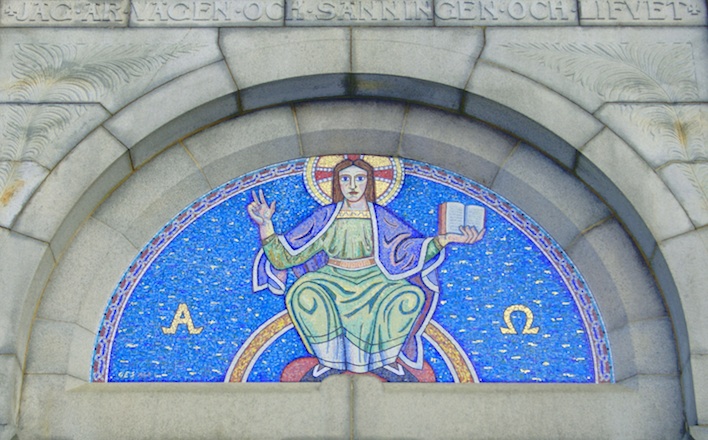Commentary on Acts 7:55-60
Back in the day, my seminary professors told us that our proclamation should recreate the effect in our own congregation that the Word had on its first hearers.
So, if all goes according to their instructions, you will end up stoned this Sunday as you utter your final words of forgiveness over your hearers. Meanwhile, that one member of the congregation—you know the one I’m talking about—will stand by sneering as he hands people their coats at the exit.
The story centers on Stephen who was introduced in the previous chapter of Acts. The dispute about equitable care for the widows among the Hellenists and the Hebrews led to the appointing of seven men of good standing to tend to these issues so that the twelve would not “neglect the word in order to wait on tables” (6:2). A similar side comment defines apostolic work with the twelve attending to “prayer and serving the word” (6:4).
The characteristics listed for these men were that they be in good standing in the church, and full of both the Spirit and wisdom (6:3). Even in this group, Stephen stands out as the first one named and the only one to receive specific praise as one “full of faith and the Holy Spirit” (6:5) and again as one “full of grace and power,” doing signs and wonders among the people (6:8). He speaks in a way that his detractors find impossible to dispute (6:10); this fulfills a promise from Jesus in Luke 21:15.
Stephen’s persuasiveness leads to a conflict in a synagogue and at this point, the narrator rallies allies among those who heard his account not with accolades like those above, but by constructing a narrative that echoes the arrest and trial of Jesus in the Gospel of Luke. These points of resemblance arise:
- a secret plot to arrest each (Luke 22:2; Acts 6:11)
- they “seize” each (Luke 22:54; Acts 6:12)
- each is brought to the council authorities (Luke 22:54, 66; Acts 6:12)
- the people are “stirred up” against each (Luke 23:5; Acts 6:12)
- each is treated as a blasphemer (Luke 22:71; Acts 6:11) and destroyer of the traditions.
Passion traditions held in other Gospels but not employed by Luke also appear in the description of what happens to Stephen:
- false witnesses come forward (Acts 6:13) and
- accusations of destroying the temple are made (Acts 6:14).
The narrator expects us to carry this impression regarding Stephen forward into Acts 7. If you want your congregation to know these connections, you have to point it out.
Unlike Jesus and his twitter length responses during his trial, Stephen speaks extensively. He rehearses the whole history of the relationship between God and Israel.
- Abraham is a recipient of a promise he never himself saw fulfilled.
- Joseph is a recipient of patriarchal hostility and betrayal.
- Moses is a man of wisdom, word, and power, resisted by his own people.
- The prophets were those who also met resistance from God’s own people.
This culminates with the accusation against Stephen’s accusers that they have followed the pattern of those who went before them.
The sermon that Stephen preaches is extensive. It is more than twice the length of any single proclamation by Peter. So much for dedication to waiting on tables being a distraction to serving the word.
When Paul comes into his own, his longest sermons do not come close to touching Stephen’s duration. In fact, even Jesus didn’t preach a single sermon in Luke that could come close to what Stephen has proclaimed.
Although this is a defense of Jesus, he is not alluded to until a single verse reference at the end of the sermon (verse 52). Stephen seems more interested in making a case for patterns of infidelity that he accuses his accusers of repeating than in demonstrating the fidelity of Jesus. No wonder they want him dead.
In his death, however, Stephen re-embodies the fidelity of Jesus in his own response to hostility.
The rhetoric of this section is interesting. The dynamic of uninterrupted discourse over an extended period—not even the narrator slipping in extra “and then he said”—keeps the hearers hearing the trial in the role of those who listened to Stephen within the Book of Acts. The audience becomes those invited to reflect on how they have manifested the patterns of infidelity.
All this is essential set-up to the actual martyrdom of Stephen. Here, too, the way of Jesus shows through Stephen’s words and deeds. Again, the spectators act out echoes of the passion narrative. But the phrases that demand attention are when Stephen speaks as Jesus has spoken.
Having seen the heavens opened, and knowing that the Son of Man will judge his innocence, Stephen forgives his tormentors: “Lord, do not hold this sin against them” (Acts 7:60). And in trust, he commends his spirit to the risen Jesus (7:59).
His ultimate message is the announcement of new beginnings, even for those who would rob him of his life. Stephen is able to love so recklessly because he has entrusted himself to Jesus.
The life and death of Jesus has given shape to Stephen’s life. He extends the forgiveness, trust, and mercy that Jesus has inaugurated. Having preached judgment with his words on those who have opted for disobedience and violence, with his forgiving dying breath, he announces the transformation the gospel creates.
His ending becomes an opportunity for a new beginning in those who watch his witness attentively. The gift of this event interrupts our failings; it did the same for the apostle Paul when he remembered his involvement in this hostility as he announced the hospitality of God that moved his own gracious vocation toward the Gentiles (Acts 22:20).


May 10, 2020